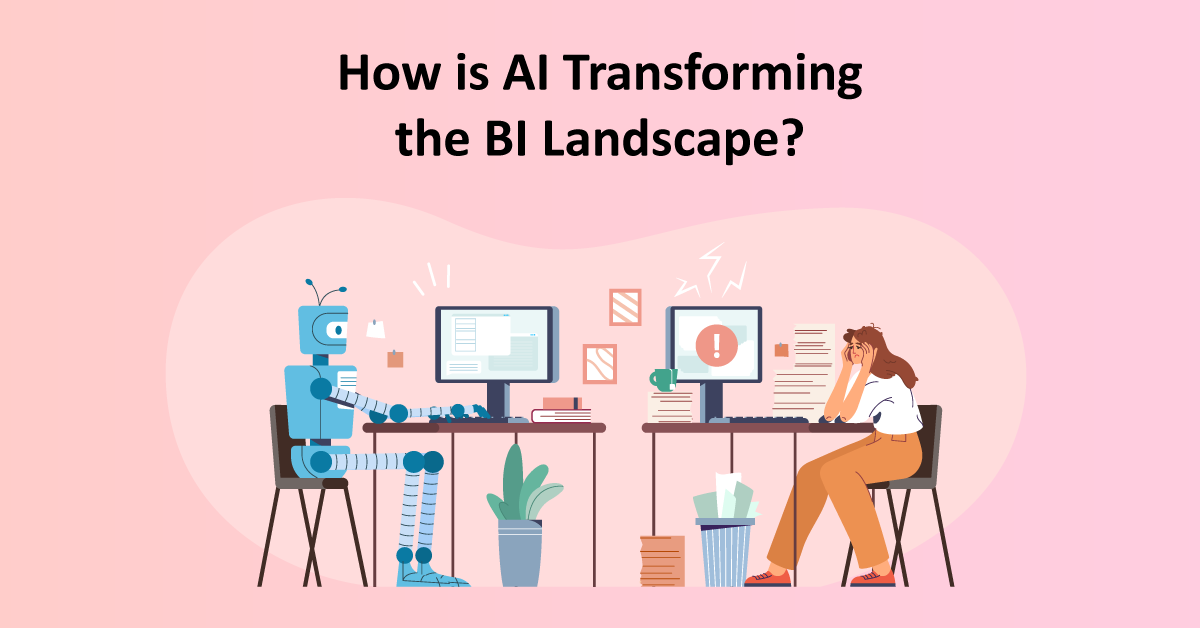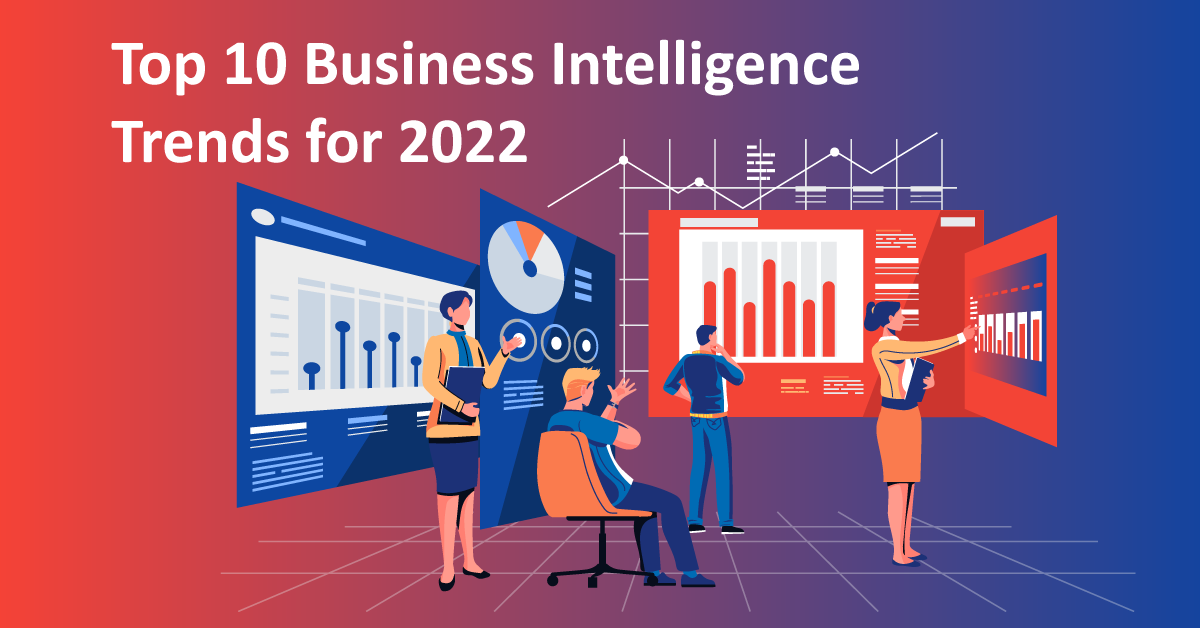How is AI Transforming the BI Landscape?
March 15, 2022

Before learning about how AI is changing the face of Business Intelligence, let’s try to get a brief understanding of Artificial Intelligence and Business Intelligence.
To state it in simpler terms, Artificial Intelligence puts human intelligence into the machines and makes them capable of performing tasks requiring human intelligence.
Look around you to find plenty of AI examples of how AI affects our lives. For example, Tesla is keenly focused on creating self-driving vehicles which work on artificial intelligence principles. You must have Amazon’s Alexa in your home, another prime example of Artificial Intelligence. You get the drift. AI surrounds us.
Whereas Business Intelligence, or BI, is a technology-based process of analyzing data sets and creating information to assist business officials in making informed decisions. BI is leveraging technology to grow businesses.
Let’s understand BI with an example. Coca-Cola, the world’s largest beverage company, has over 35 million Twitter followers. Coca-Cola has efficiently used its social media data. With AI-powered image-identification technology, Coca-Cola can tell when the photographs of its soft drinks post online. With the help of such data, Coca-Cola can gather insights into who is drinking their beverages and what people have posted about them. Such a piece of information helps Coca-Cola serve consumers more focused advertising that can result in a quick call to action than a generic advertisement.
You might have got an idea about where we are going with this article. The usage of AI has transformed the processes and businesses around us. Conventional ways of doing business are nowhere to be seen now.

The Attraction of AI Business Intelligence
AI Business Intelligence has gained popularity since it works well for businesses. Business Intelligence has improved revenue streams and produced interesting insights. AI Business Intelligence has generated higher revenue streams and interesting insights. AI and BI collaboratively help businesses get valuable insights that enable them to forecast industry standards and take business decisions accordingly.
One important assistance from the end of AI is process automation. Today, businesses are focusing on expansion, reducing overhead expenses, and enhancing the customer experience. AI has been bliss to the businesses that know how to discover its potential. For instance, AI assists web developers in designing a highly functional website to enrich the user experience, which directly increases the chances of a call to action by any visitor.
Without AI, companies cannot leverage the importance of data. AI seeks to bring the truth based on facts rather than human biases. The main impact of AI in the near future will come from its ability to create jobs currently performed by humans. Hence saving the time and the cost of businesses.

How AI empowers BI applications?
As discussed above, BI is all about collecting, processing, and analyzing data in order to extract valuable information and insights for informed business decisions. Now, let’s understand how AI is resolving the shortcomings of BI.
AI improves BI’s functions
The core function of business intelligence is to improve business decisions. Prior to AI, businesses had to rely on incomplete and disfigured data. But now, AI has helped to churn the data load into smaller chunks of valuable information. Take the example of Coca-Cola again; with the help of statistics on the demographics of beverage consumers, the marketing managers are supposed to take business decisions accordingly and highly focus on futuristic marketing techniques.
Simplification of Complex Processes
Even with the presence of BI, reading the data is a cumbersome process. A data analyst has to survey hundreds of data charts to get useful insight. But, here, AI saves the day and simplifies the data analysis with the help of deep learning or machine learning.
AI with machine learning enables machines to understand human language, which further helps analysts to gather useful insights.
Used across the industries
AI has been helping to create positive changes in many fields, such as accounting, human resources and healthcare. For example, with the expansion of business comes the large pile of consumer data. AI, along with BI, has helped to resolve that problem too. For instance, AI-driven tools are helping to diagnose their patients faster than before, while in the accounting and human resource field, AI is helping to reduce the redundant data in order to smoothen the business processes.
Offers useful insights along with consistency
AI provides real-time feedback data to improve prescriptive models. This assures that the next decision will be better than the previous one because of the availability of enough data and insights. With the changing times, as organizations are generating large amounts of data, AI shall improve decision-making ability, further improving profitability.
Examples of AI in Business Intelligence
Now we shall understand how AI is helping business intelligence to simplify and enhance the business processes at the same time. We shall see the use of AI applications in specific business functions to get significant results.
SAP – A Useful Intel
Hana, SAP’s cloud platform, lets users manage databases of information. The platform absorbs data from various sources and creates useful databases. It allows users to access the platform via on-premise servers or in the cloud. Hana is capable enough to churn out information from financial entries, sensors and desktops.
For example, an employee uses a smartphone to record purchases; they can use Hana to identify trends or any irregularities.
Alibaba’s City Brain Project
Alibaba uses AI in its City Brain Project to create smart cities. AI algorithms help to reduce traffic jams by monitoring every vehicle in the city. Alibaba also uses Alibaba Cloud to help the farmers to improve the yield and reduce the costs.
Avanade for business insights
A joint program of Accenture and Microsoft based on Cortana Intelligence Suite offers solutions for predictive analytics and discovering data insights. With the help of predictive analytics, the platform provides insights into the business for better decision-making.
IBM’s Project Debater
IBM has been at the top of the AI game for many years. The latest AI platform launched by IBM is Project Debater. It is a computed engine that competed against professional debaters in an official debate competition.

Does AI have any disadvantages?
While we talked about all the good things about AI, some disadvantages of AI are equally important to discuss.
Expensive
AI solutions are typically more expensive than any other SaaS-based solution. AI applications also include third-party consultants to finalize the platform. As a result, many businesses will not hold AI under their business umbrella and use it to its full potential. AI seems to be a useful tool for the big players only.
Technical Expertise is a must
In order to extract their full potential, AI requires regular human interaction and expertise. It can get difficult for some businesses to provide Expertise daily. Since it may affect the jobs that are done today by humans, before that, a lot of human intervention is required to formulate the Artificial Intelligence applications fully.
Too much automation
Automating business processes can have some disadvantages. Heavy automation removes the need for human operations and reduces the chances of any innovation. In the long run, it will be detrimental to businesses, especially when they are required to be open to change.
Business Intelligence applications will turn out to be a great asset to enterprises and improve their ability to understand big data. AI will assist organizations in the coming times as their needs continue to grow.
Businesses need to present data visually today, so software that predicts accurately in real-time would be of the utmost importance. Then AI can demonstrate its potential and enable businesses to seek a highly competitive position on the market. AI will enable organizations to achieve their digital transformation strategies.
As technology develops over time, businesses will experience more business automation, thus opening up new opportunities for growth and expansion. AI and BI are two technologies that have the potential to shape our future.











